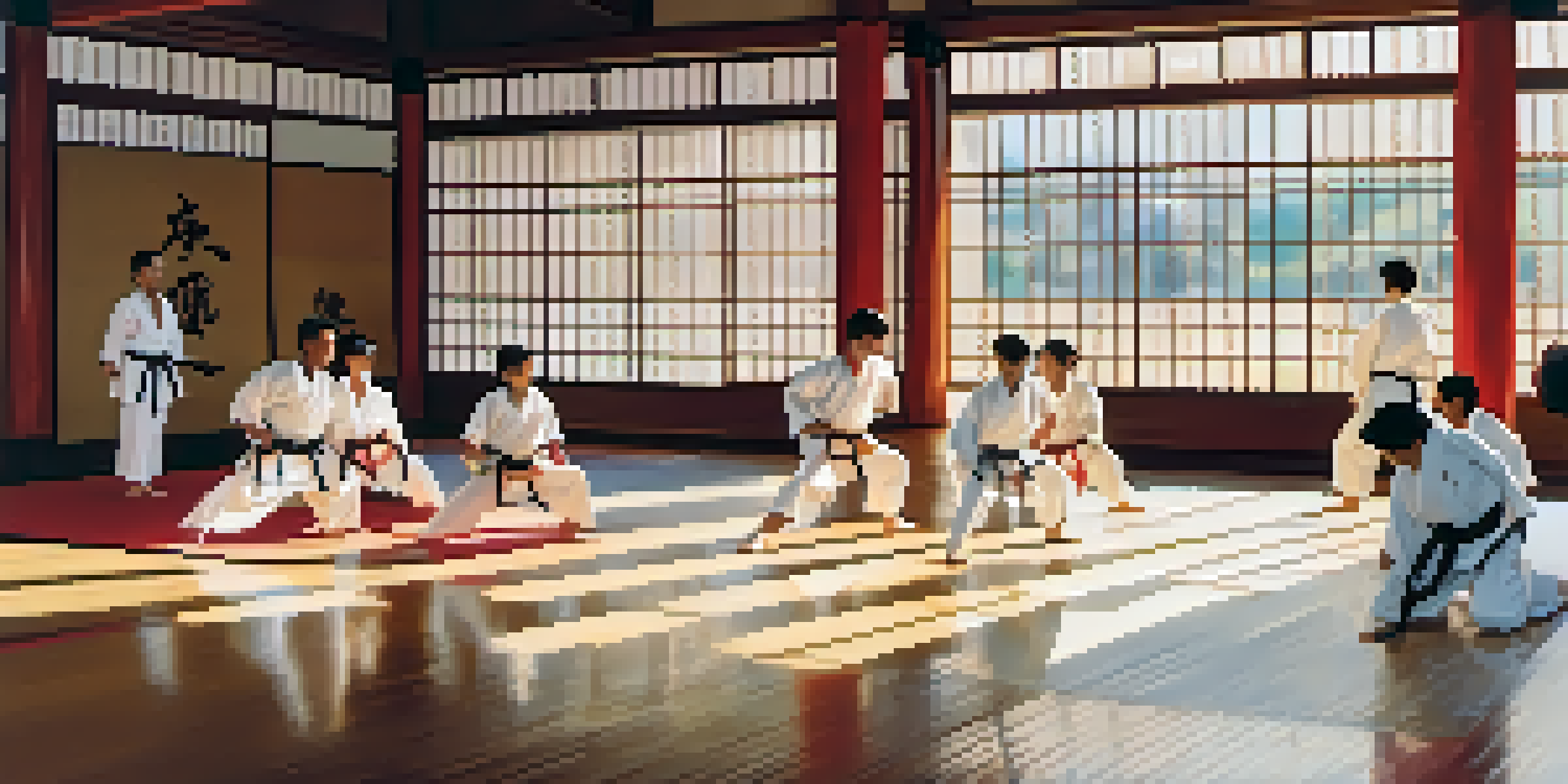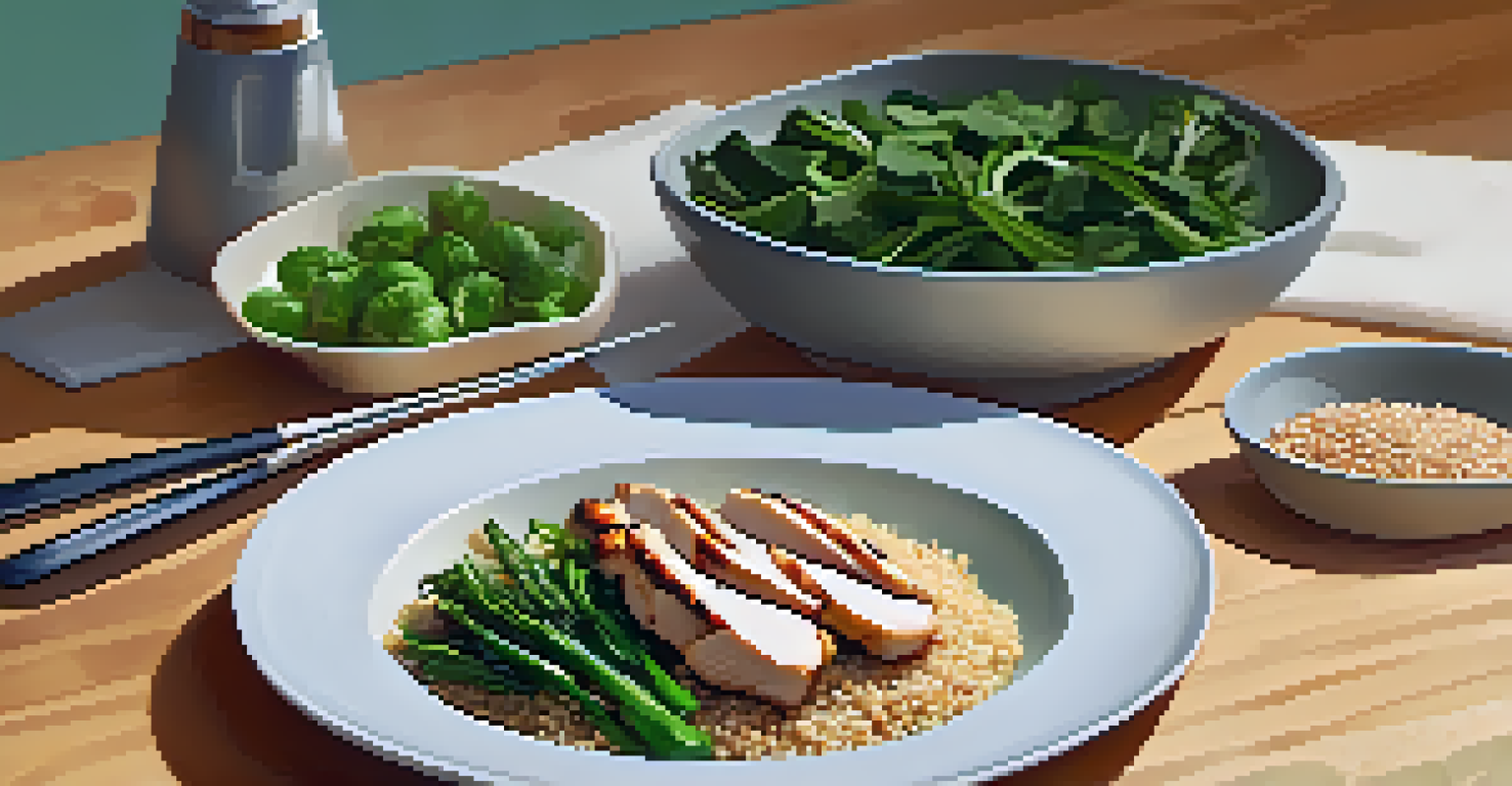Weight Management Strategies for Competitive Martial Artists

Understanding Weight Classes in Martial Arts
Weight classes are crucial in competitive martial arts as they ensure fair fights between athletes of similar sizes. For martial artists, understanding these classes helps in planning their training and nutrition strategies. The goal is to compete at the optimal weight while maintaining strength and agility.
The body achieves what the mind believes.
Each martial art has its own weight divisions, and knowing where you fit can significantly impact your performance. For instance, a fighter in a lower weight class might have speed but lack the power of a heavier opponent. Balancing your weight is essential to leverage your unique strengths effectively.
Moreover, observing the competition in your weight class can inform your training regimen. By analyzing your opponents, you can tailor your weight management strategies to gain a competitive edge. This knowledge is a stepping stone toward successful weight management.
Setting Realistic Weight Goals
Setting weight goals is not just about hitting a number on the scale; it’s about achieving performance optimization. Realistic goals take into account your body composition, training schedule, and upcoming competitions. Instead of drastic weight loss, aim for gradual changes that won’t compromise your strength or endurance.

For example, if you need to lose five pounds for an upcoming match, plan to lose it over several weeks rather than days. This approach minimizes the risks of dehydration and fatigue, which can severely impact your performance. Remember, your body needs time to adjust to any changes.
Weight Classes Ensure Fair Competition
Understanding weight classes is essential for martial artists to optimize their training and compete effectively against similarly sized opponents.
Additionally, tracking your progress can help you stay motivated. Use a journal or an app to log your weight, body measurements, and energy levels. This data not only keeps you accountable but also helps you understand what strategies work best for your body.
Nutrition Tips for Effective Weight Management
Nutrition plays a pivotal role in weight management for martial artists. A well-balanced diet fuels your training and aids in recovery while helping you reach your weight goals. Focus on whole foods that provide essential nutrients, such as lean proteins, whole grains, fruits, and vegetables.
Success is where preparation and opportunity meet.
Consider the timing of your meals as well. Eating smaller, frequent meals throughout the day can help maintain energy levels and prevent overeating. For instance, a pre-training snack can boost your performance, while a post-training meal aids recovery.
Hydration is another critical component of nutrition. Staying properly hydrated helps regulate body temperature and enhances overall performance. Aim to drink water regularly, and consider electrolyte drinks during intense training sessions to replace lost minerals.
The Importance of Strength Training
Strength training is often overlooked in weight management strategies, yet it’s essential for martial artists. Building muscle not only improves performance but also increases your resting metabolic rate, making it easier to maintain or lose weight. Incorporating resistance exercises into your routine can lead to significant gains.
For instance, exercises like squats, deadlifts, and push-ups can enhance your overall strength and power, which are critical in martial arts. Additionally, strength training helps prevent injuries by stabilizing joints and improving balance, vital for any fighter.
Set Realistic Weight Loss Goals
Achieving gradual weight loss through realistic goals helps maintain strength and performance, reducing risks associated with rapid changes.
Aim to include strength training at least two to three times a week, focusing on all major muscle groups. This balanced approach ensures you remain strong and agile while effectively managing your weight.
Mindfulness and Mental Focus in Weight Management
Managing weight isn’t solely a physical challenge; it’s also a mental one. Practicing mindfulness can help martial artists develop a better relationship with food and their bodies. Techniques like meditation or deep breathing can reduce stress, which is often linked to unhealthy eating habits.
For example, before meals, take a moment to assess your hunger levels and emotional state. This awareness can help you make more conscious choices about what and how much to eat. It’s about creating a healthy mindset that supports your weight management goals.
Additionally, visualization techniques can enhance your focus during training and competitions. Imagine yourself at your desired weight, performing at your best. This mental rehearsal can motivate you to stick to your weight management strategies.
Monitoring Progress and Adjusting Strategies
Regularly monitoring your progress is vital to successful weight management. This can include tracking your weight, body composition, and even performance metrics. By keeping a close eye on these factors, you can identify what’s working and what needs adjustment.
For example, if you find you’re losing weight but your performance is declining, it might be time to reassess your nutrition or training regimen. Conversely, if your weight is stable but you’re feeling sluggish, consider increasing your calorie intake or modifying your workout intensity.
Nutrition Fuels Performance and Recovery
A well-balanced diet, proper meal timing, and hydration are crucial for martial artists to manage weight while supporting their training and recovery needs.
Using tools like apps or fitness trackers can simplify this process, making it easier to stay on top of your goals. Remember, flexibility is key; be willing to adapt your strategies as needed to ensure you’re always performing at your best.
Seeking Professional Guidance for Optimal Results
While self-management is important, seeking professional guidance can take your weight management to the next level. Nutritionists, dietitians, and coaches can provide tailored advice based on your specific needs and goals. They can help you create a personalized nutrition plan that supports both your weight and performance.
For instance, a sports nutritionist can help you understand the right macronutrient ratios for your training and recovery. They can also guide you on meal timing and portion sizes to ensure you’re fueling your body effectively.

Additionally, training with a coach can help refine your techniques and ensure your workout plans align with your weight management strategy. Expert guidance can make a significant difference in achieving your competitive goals.